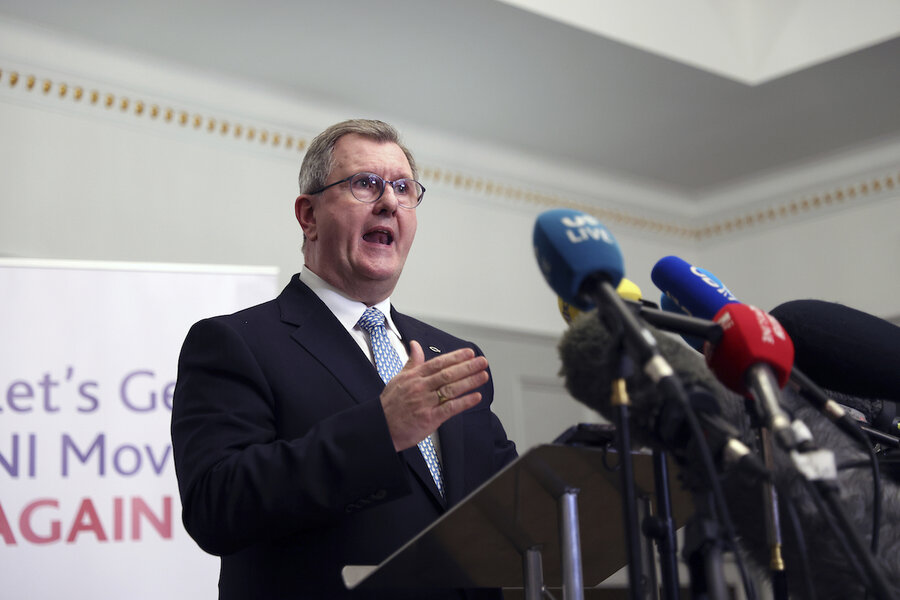In Northern Ireland, a long-awaited moment of compromise
Loading...
| London
The U.K. government on Jan. 31 published the details of a deal that has broken Northern Ireland’s political deadlock and should – barring a major upset – restore the regional government in Belfast after almost two years on ice.
Unveiled on the fourth anniversary of the U.K.’s departure from the European Union, the agreement eases some of the border checks imposed because of Brexit that unsettled Northern Ireland’s delicate political balance and sparked a political crisis.
Crisis, what crisis?
Britain’s exit from the European trading bloc in 2020 imposed new trade barriers between the U.K. and the EU, and also between Northern Ireland and the rest of the U.K. That’s because Northern Ireland shares a border with an EU member, the Republic of Ireland.
An open border between the north and the republic is a key pillar of the peace process that ended three decades of violence in Northern Ireland, so checks were imposed instead between Northern Ireland and the rest of the U.K.
That angered Northern Ireland’s British unionists, who said the east-west customs border undermined Northern Ireland’s place in the U.K. In February 2022, the Democratic Unionist Party walked out of Northern Ireland’s government in protest.
The walkout collapsed the administration. Under the terms of the 1998 Good Friday peace accord, power must be shared between Northern Ireland’s two main communities – British unionists who want to stay in the U.K., and Irish nationalists who seek to unite with Ireland. One side can’t govern without the other.
The DUP boycott left Northern Ireland’s 1.9 million people without a functioning administration for two years as the cost of living soared and public services creaked under the strain.
What broke the boycott?
The U.K. government sought to coax the DUP back into government by easing the burden of the border checks.
In February 2023, the U.K. and the EU agreed on a deal, known as the Windsor Framework, that eased customs checks and other hurdles for goods moving to Northern Ireland from the rest of the U.K. But it didn’t go far enough for the DUP, which continued its boycott.
The new changes go a bit farther, eliminating routine checks and paperwork for goods entering Northern Ireland, although some checks will remain “as part of a risk-based or intelligence-led approach” to tackle crime or disease.
It also makes legal tweaks designed to reassure unionists that Northern Ireland’s position in the U.K. is secure. The agreement includes legislation “affirming Northern Ireland’s constitutional status” as part of the U.K. and gives local politicians “democratic oversight” of any future EU laws that might apply to Northern Ireland.
More concretely, the U.K. government also agreed to give Northern Ireland more than 3 billion pounds ($3.8 billion) for its battered public services once the Belfast government is back up and running.
DUP leader Jeffrey Donaldson said the agreement wasn’t perfect, but it marked “a positive and decisive step forward for Northern Ireland.”
“I won’t claim that every battle has been won or even that every battle is finished,” he said, but added that the deal would allow Northern Ireland politicians to “bank the progress we have made, the gains and the changes we have secured, and continue making the case for further change”
What happens next?
The deal doesn’t have universal support. Some unionists and hard-line Brexit supporters argue that Northern Ireland will still be treated differently to the rest of the U.K. in order to keep the U.K.’s deal with the EU intact.
But the British and Irish governments, and the DUP leadership, all support the deal, and the necessary legislation is likely to be sped through the U.K. Parliament on Thursday.
The Northern Ireland Assembly then can meet to elect a speaker, followed by the nomination of a first minister and a deputy first minister.
The new first minister is likely to be Michelle O’Neill of Irish nationalist party Sinn Fein – a landmark in Northern Ireland, which was established as a unionist, Protestant-majority state in 1921.
Unionists were the largest force in the Northern Ireland Assembly from its establishment in 1998 until 2022, when Sinn Fein won the largest number of seats in an election. That gives the nationalist party, affiliated with the militant Irish Republican Army during the Troubles, the right to hold the post of first minister, with the DUP supplying a deputy.
This story was reported by The Associated Press.





